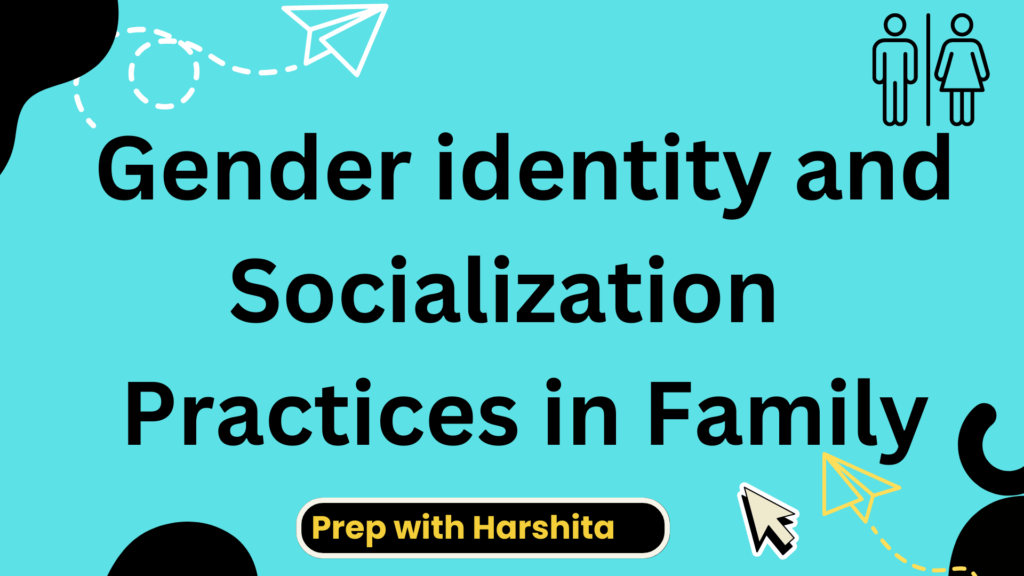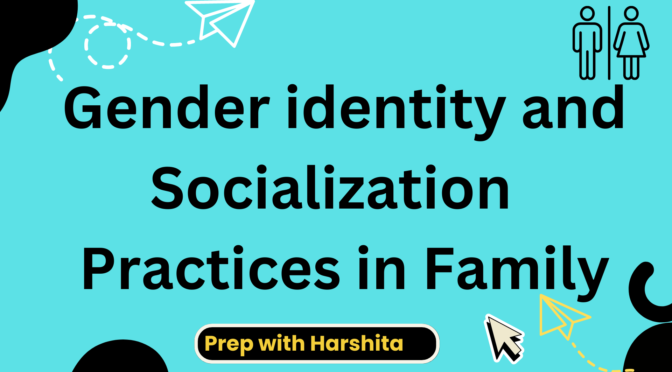Gender identities and socialization practices within the family are deeply intertwined and play a significant role in shaping individuals’ understanding of themselves and their roles in society.
Let’s explore this topic in more detail:
- Gender Identities: Gender identity refers to an individual’s internal sense of their own gender, which may be different from their assigned sex at birth. While many people identify with the gender they were assigned at birth (cisgender), others may identify as transgender, non-binary, genderqueer, or with other diverse gender identities.
- Socialization Practices: Socialization is the process through which individuals learn and internalize societal norms, values, and behaviors. Family is one of the primary agents of socialization, where children acquire knowledge and expectations about gender roles and behaviors.
Socialization practices related to gender can include the following:
a. Gendered Roles and Expectations: Families often socialize children into gendered roles and expectations. This can involve assigning different tasks, responsibilities, and privileges based on gender. For example, girls may be encouraged to engage in activities associated with nurturing and domesticity, while boys may be encouraged to be independent and assertive.
b. Gendered Toys and Activities: Families often provide children with toys, games, and activities that align with traditional gender roles. Girls are often given dolls, kitchen sets, and dress-up items, while boys are given action figures, building blocks, and sports equipment. These choices can reinforce gender stereotypes and limit children’s exploration of diverse interests.
c. Language and Communication: Families use language and communication patterns that can reinforce gender norms. For instance, girls may be praised for being “pretty” or “sweet,” while boys may be encouraged to be “strong” or “brave.” Parents and caregivers may also use gendered pronouns and labels when referring to children or discussing their abilities and future aspirations.
d. Role Modeling: Parents and family members serve as role models for children’s gender behaviors and attitudes. Children observe and imitate the behaviors they see from their parents, siblings, and other family members. For instance, a child may learn about gender roles by observing how their parents divide household chores or engage in caregiving activities.
e. Reinforcement and Punishment: Families often reinforce or discourage certain gendered behaviors through rewards and punishments. For example, a girl who expresses interest in traditionally male-dominated activities may face disapproval or even punishment, while a boy who conforms to societal expectations may receive praise or rewards. - Impacts and Consequences: Gender socialization within the family can have lasting impacts on individuals. It shapes their self-perception, sense of identity, and understanding of acceptable behavior.
Some potential impacts include:
a. Gender Stereotyping: Socialization practices can reinforce gender stereotypes and limit individuals’ freedom to explore diverse interests and expressions. This can perpetuate inequality and restrict opportunities for personal growth and self-fulfillment.
b. Gender Role Expectations: Socialization can instill rigid expectations about gender roles, limiting individuals’ choices and creating pressure to conform. This can affect career choices, family dynamics, and overall life satisfaction.
c. Gender Inequality: Socialization practices that prioritize certain gender roles and behaviors can contribute to gender inequality. For example, when girls are socialized to prioritize nurturing and caregiving, they may face barriers in pursuing careers or leadership positions.
d. Trans and Non-Binary Experiences: In families where gender identities diverge from societal norms, socialization practices can have unique challenges. Transgender and non-binary individuals may face rejection, misunderstanding, or lack of support, leading to strained family relationships.
It’s important to note that socialization practices vary across cultures, and there is increasing recognition of the need for more inclusive and egalitarian approaches.
Also Read: Gender Stereotyping

Also visit: Prep with Harshita

